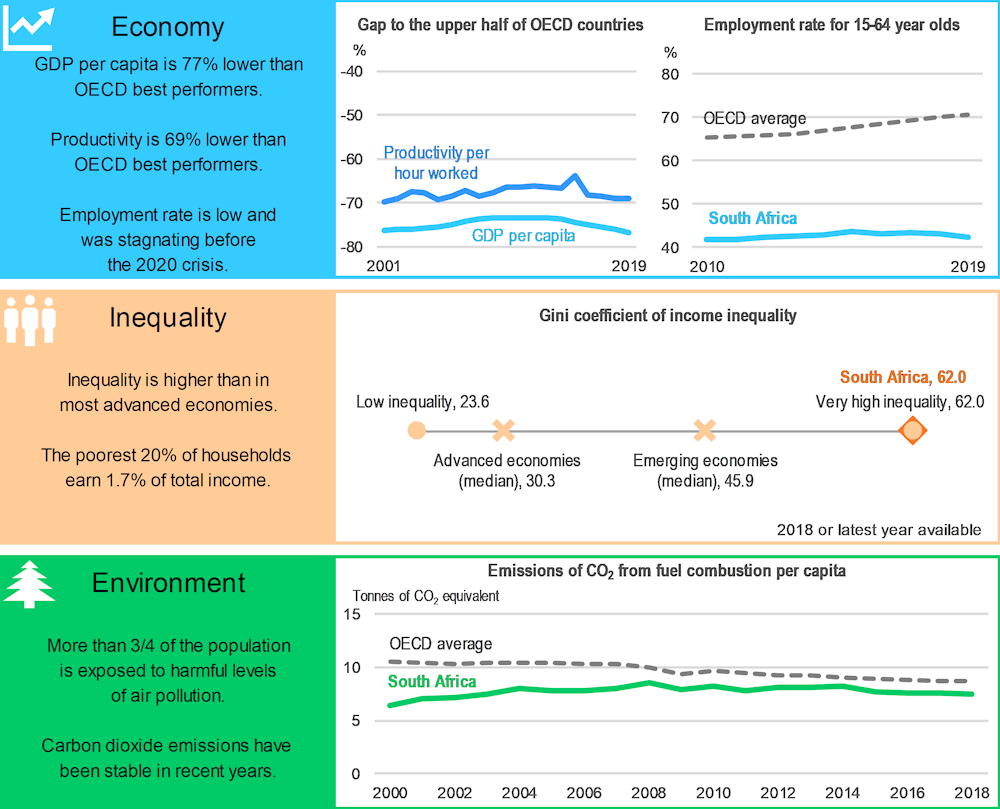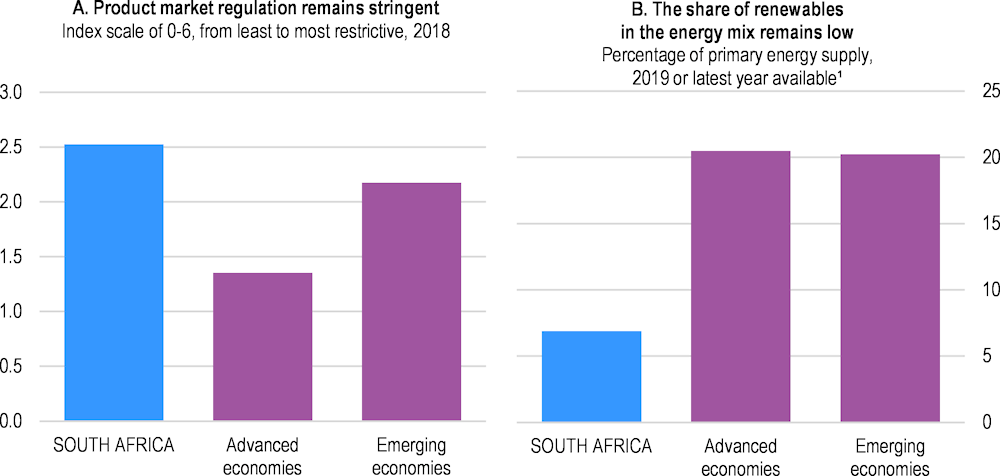The COVID-19 pandemic caused millions of workers to lose their jobs, while the number of discouraged workers increased. Investment has been on a downward path already prior to the crisis, marred by policy uncertainty, lack of infrastructure leading for example to electricity shortages and lacklustre government financial prospects. Regulatory restrictions in many areas, including network industries, are a threat to the recovery. Stronger growth is needed to place the government debt trajectory on a sustainable path and to finance large unmet needs in education, health and social spending.
Economic Policy Reforms 2021

South Africa
South Africa: Performance prior to the COVID-19 crisis

Economy: Percentage gap with respect to the population-weighted average of the highest 18 OECD countries in terms of GDP per capita (in constant 2015 PPPs).
Inequality: The Gini coefficient for disposable income measures the extent to which the distribution of disposable income among households deviates from perfect equal distribution. A value of zero represents perfect equality and a value of 100 extreme inequality. The latest available data for South Africa is 2015.
Environment: A high exposure to air pollution refers to above 10 μg/m3 of PM2.5.
Source: Economy: OECD, National Accounts, Productivity and Labour Force Statistics Databases; Inequality: OECD, Income Distribution Database and World Bank, World Development Indicators Database; Environment: OECD, Environment and Energy Databases.
Unleashing investment to boost productivity and job creation
To improve its resilience and growth potential, as well as to recover from the COVID-19 crisis in a more dynamic and sustainable way, South Africa will need to improve the allocation of resources and create job opportunities. Removing barriers to competition and lifting regulatory restrictions in many sectors (Panel A), but in particular more competition in network industries would bring down prices, increase the accessibility of services, stimulate downstream firms’ competitiveness and raise productivity growth. Competition and good governance should be safeguarded by giving the energy and telecommunication regulators greater independence and encouraging closer and better collaboration between the competition authorities and sector regulators.
Entrepreneurship in South Africa is weak compared to other emerging economies, and the slowing growth and COVID-19 crisis have compounded an already difficult environment for new and small businesses before the pandemic. Reducing red tape and barriers to entrepreneurship should aim at further reducing the bureaucratic procedures and licensing, which remain a burden on small firms. Improving access to finance should be prioritised by increasing financial and non-financial government support for entrepreneurs and small businesses.
Public infrastructure investment has dropped in recent years in addition to declining private investment. The speed, quality and efficiency of many public investment projects also have been low. High quality, accessible infrastructure investment should be increased, by accelerating the operations of the infrastructure fund with the private sector, development finance institutions and multilateral development banks. The fund should aim to increase the number of blended-finance projects, enhance oversight, improve the speed and quality of spending, and reduce costs in public infrastructure. Developing well-structured public-private partnerships could also boost infrastructure investment, and in particular participation of private capital in ports and rail.
South Africa: Vulnerabilities and areas for reforms

1. 2018 for South Africa.
Source: Panel A: OECD, Product Market Regulation Database 2018; Panel B: OECD, Green Growth Database.
The low quality of the education system, high drop-out rates and the lack of work experience contribute to gaps in entrepreneurial skills. Improving the quality of education would boost human capital accumulation and reduce the high levels of inequality.
South Africa is a heavy greenhouse gas emitter. Coal is the major energy source for electricity and industrial processes, contributing to air pollution with impacts on premature mortality rates and child development. Greener energy policy can bolster growth and limit environmental impact through investment in renewable energy (Panel B) and other low-carbon technologies. Building on recent progress in carbon pricing, a more ambitious carbon tax over the medium-term should be combined with the regulatory reforms to increase the responsiveness to such price signals and revenue recycling to shield low income households from adverse effects.
South Africa: Summary of Going for Growth priorities and recommendations
|
2019-2020 Reforms |
Recommendations |
|---|---|
|
Competition and regulation: Remove barriers to competition and lift regulatory restrictions |
|
|
☑ The Competition Act has been amended in 2018 to give South African competition authorities extended powers to investigate market concentration and impose structural remedies. ☑ The STER Bill, which seeks to consolidate economic regulation and policy of the transport sector within a single framework through establishing the Single Transport Economic Regulator (STER) and the Transport Economic Council, has been put before parliament since January 2020. |
□ Enhance competition in network industries. □ Rule out granting state-owned enterprises exemptions from the competition law. □ Secure effective separation of generation, transmission and distribution of electricity. □ Strengthen the independence of network regulators. □ Unbundle the division of the state-owned transport conglomerate Transnet and open access to public infrastructure to private service providers. |
|
Competition and regulation: Reduce barriers to entrepreneurship |
|
|
☑ The Small Business and Innovation Fund to support entrepreneurs from the idea and pre-start-up phases all the way to the growth stage has been established, with operations to start in 2020. ☑ Insolvency laws are being reviewed and updated to reduce limitations to future access to credit for anyone who previously had been declared insolvent. |
□ Reduce red tape and barriers to entrepreneurship. □ Introduce a “silence is consent rule” for licensing procedures that have low associated risks. Systematically review and reduce licensing requirements. □ Reduce the severity of bankruptcy rules, in particular severance payments, to facilitate second chances for entrepreneurs. □ Evaluate and streamline financial and non-financial support for start-ups and small businesses. □ Undertake regulatory impact assessments systematically for all new legislation and review existing legislation with a view to reducing the regulatory burden. □ Increase entrepreneurial education and work placements in the post-school education/training system. |
|
Infrastructure: Improve infrastructure to boost growth |
|
|
☑ Announced in September 2018, the creation of the Infrastructure Fund has advanced in August 2020 with the mandate given by the government to the Development Bank of Southern Africa (DBSA) to establish, manage and administer the Fund with financing from the National Treasury. |
□ Accelerate the operationalisation of the Infrastructure Fund. □ Boost infrastructure spending. □ Strengthen the administrative capacity to plan, manage and conduct infrastructure projects. □ Increase maintenance of transport infrastructure. □ Provide special economic zones with better infrastructure and develop their linkages with local economies. □ Develop public-private partnerships in infrastructure investment. □ Promote competition in infrastructure-related services across the country to deepen regional integration. |
|
Education and skills: Raise quality and equity in education |
|
|
☑ Since 2018, free tertiary education is being phased in over the next three years for qualifying first-year students from low-income households. |
□ Improve teacher training, enhance accountability and increase monitoring of school leadership. □ Gradually phase out school fees in the public primary school system. □ Teach English as a second language earlier in the curriculum, while maintaining mother-tongue instruction for longer. □ Upgrade school infrastructure. □ Expand vocational education and training. |
|
*Environmental policy: Green energy policy to limit environmental impact* |
|
|
*New priority * |
□ Use the ongoing restructuring of Eskom (the electricity monopolist) to diversify power generation and invest in renewable sources of energy. □ Accelerate the increase of carbon tax and use the revenues to compensate low-income households. □ Replace coal-fired power plants with renewables to increase energy security as well as reduce the costs of water stress. |
Recent progress on structural reforms
Progress on structural reforms has been slow mainly due to a lack of political consensus. After five years of low growth, declining investment and rising unemployment, the country needs a bold implementation of reforms to face mounting challenges and restore the economy’s growth potential.